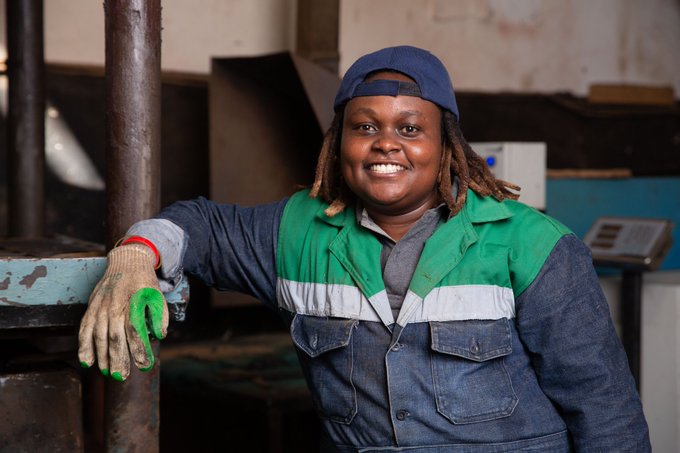CLIMATE CAPITAL
Daring To Conquer Plastic Pollution With Bricks
Gjenge Makers addresses the duo issues of plastic waste and the housing crisis through its plastic brick solution. Going by its “Build Alternatively, Build Affordably” model, it seeks to provide a crucial product that could empower individual communities by giving them the resources needed to rise out of poverty.

: Nzambi Matee’s Gjenge Makers recycles plastic waste into durable, affordable bricks, addressing Kenya’s housing crisis with sustainable construction materials.
By Charles Wachira
“ As I like saying, you have to be true to your why. Why are you doing whatever you are doing? What is the motivation behind it? For me, I was just tired of being on the sidelines of seeing plastics pollute the environment. And see where we are today. So act when you can and let the chips fall where they may,” says Nzambi Matee.
It was unmistakably her. Donning light blue overalls spotting visibly dark grease, her 5 ft 6 inches frame stood hospitable and somewhat down-to-earth in functional yellow boots. While a white beaded rosary lazily dropped on her neck, creating an indelible impression of a measured personality, if not spiritual.
And although her attendant mature girl locs gave her a tomboyish demeanor, her elocution underlined a polished elegance that betrayed a girl about town socialization.
Meet Nzambi Matee, 33, the 2020 Young Champion of the Earth winner, the UN’S highest environmental honour, given to individuals, groups and organizations that have had a transformative impact on the environment.
She’s the founder of Gjenge Makers Ltd, a Nairobi based social enterprise that addresses the prevailing issue of waste pollution in Kenya’s capital.
This former alumna of Jomo Kenyatta University of Agriculture and Technology (JKUAT)eponymously named after the country’s founding President who in 1978, , donated two hundred hectares of farmland for the establishment of the college where she studied physics and material science, recycles and up cycles plastics to strong and beautiful construction materials, with bricks standing out.
In a nutshell, Gjenge Makers addresses the duo issues of plastic waste and housing crisis through its plastic brick solution. And going by its “Build Alternatively, Build Affordably” model, it seeks to provide a crucial product that could empower individual communities by giving them the resources needed to rise out of poverty.
“ It’s my personal goal to help build more shelters to combat the housing crisis with our products which we make sure are accessible to essential institutions such as schools,” says Matee.
She adds that the bricks are made from a combination of plastic and sand with the pavers having a melting point higher than 350°C which makes them more durable than their concrete counterparts.
“ They have numerous advantages when compared to the conventional ones, for example they are 30 % more durable,” says the Mukuru Slums Development Project Manager, Veto Francis, whose organization is a client.
Matee worked as a data analyst and oil-industry engineer, prior to launching her company. In 2017, she quit her job and went ahead to create a small lab in her mother’s backyard home located in the eastern parts of Nairobi, a locale that nurtures a hustling and competitive spirit among denizens, where she tested sand and plastic combinations.
There she initially began manufacturing pavers.
Her neighbours understandably griped about the noise emanating from the nascent machine she was using but resentment only emboldened her to remain on track. It took a year to develop the right ratios for her paving bricks.
Like all determined entrepreneurs while she was on the throes of beginning her new act of becoming an entrepreneur she shut down her social life and plowed her entire savings into the project.
A UNEP website explained the throes of her entrepreneurship journey by stating that “Through trial and error, she and her team learned that some plastics bind together better than others. Her project was given a boost when Matee won a scholarship to attend a social entrepreneurship-training programme in the United States of America. With her paver samples packed in her luggage, she used the material labs in the University of Colorado Boulder to further test and refine the ratios of sand to plastic.”
Her time at the U.S based university gave her time to complete two important things: Finalize the machines that make the recycled materials into pavers and also refine the plastic-to-sand ratio pro-type.
Coincidentally, her workplace is located along Nairobi’s Industrial Area, which is synonymous with Kenya’s manufacturing sector, a locale found south east of the city’s Central Business District (CBD).
The location, verifiably, has a rich history.
Mooted in 1948 by the British administration, the 9.6 Km2 piece of land is a meticulous handiwork displaying the deliberate planning of the colonialists. In fact, on close scrutiny one is able to see derelict railway lines snaking on the newly carpeted tarmacked roads, encapsulating where the 1895 built Uganda-Kenya railway once did roaring business.
Today, the place still looks bustling with synonymous armies of workers who toil in the modern day factories that have resisted the temptation of relocating to more business friendly locations. But conspicuously missing are smoke spouting factory chimneys associated with fossil oil, an auspicious tell-tell sign, this East Africa state is on track of retiring fuel-oil -fired plants by 2030.
A homogeneous black gate stands in front of the workplace. You cannot see what is happening inside until when the sentry opens.
My goodness, once you are given entrée one discovers a rectangular yard that is one to behold .As paving tiles of generic colours, green, blue, black, you name it – make the place simply a beautiful riot of shades.
“ These are the sorts of bricks that we manufacture here. Right now the company generates between 1,000 and 1,500 bricks daily. They are 35% more durable than traditional bricks, seven times stronger than the usual standard bricks and they are relatively cheaper to purchase,” says Matee.
Inside the building that has a chock a –block feel noise from operating machines overwhelm the place that noticeably has a youthful crop of workers. From what I see I can tell the company has three machines, including an extruder that does the mixing of plastic waste with sand, at very high temperatures and a press that compresses the concoction.
“Since plastic is fibrous in nature the brick ends up having a stronger compression strength,” says Matee.
“ There are about 80 of us here and you can do the math of the number of people who rely on us for employment. We also contract people to supply us with waste from packaging factories which we get for free, although we pay for the plastic that we get from other recyclers,” says Matee.
Kenya’s unemployment rate currently is 10.4 percent, according to the Kenya National Bureau of Statistics.
Martin Njoroge was jobless despite holding an undergraduate degree from the local Kenyatta University until when he met Matee who offered her a job.
“Here we work in shifts, depending on the orders placed,” says Njoroge.
With some 4 million or years, inhabitants, Kenya’s capital produces around 2,400 tonnes of solid waste daily with only 45% of the waste generated undergoing any sort of recovery or treatment process. Disproportionately most of it ends up in open dumps or is burned.
From her telling, Matee was inspired to launch her business after habitually coming face to face with the scourge of plastic bags along the streets of the tenth most populated city in Africa.
“ I was seeing litter everywhere in Nairobi. It was pervasive. And while I understood that plastic waste was a global problem, I opted to do something practical and useful about the issue instead of complaining,” says Matee.
She set her mindset to singularly focus on one of the three basic needs necessary for a human being to survive including food, shelter and clothing.
“ I settled on shelter. My goal was to look at ways of converting plastic waste to assist in the provision of shelter in the housing space,” she says.
She certainly had her work cut out.
According to the Organisation for Economic Co-operation and Development (OECD), Africa has the world’s fastest urban growth rates and by 2050, its cities will be home to an additional 950 million people.
And it’s estimated that for the next 20 years 40,000 people in Africa will be relocating into its cities every day.
In fact, several recent studies project that by the end of this century, Africa will be the only continent experiencing population growth. With 13 of the world’s 20 biggest urban areas expected to be in Africa — up from just two today — as will more than a third of the world’s population.
And according to Habitat for Humanity, a global nonprofit housing organization, Kenya has an annual housing demand of 250,000 units with an estimated supply of 50,000 units, culminating in a housing deficit of 2 million units, or 80% deficit.
“ Housing affordability is a key challenge in Kenya with many people unable to afford to buy or build their own home. Only 2% of the formally constructed houses target lower-income families. About 6.4 million people, of Kenya’s urban population live in informal settlements. Many families are at high risk of diseases such as malaria, respiratory infections and or parasitic jiggers infestation,” says Habitat.
To date, Gjenge Makers has recycled more than 20 tons of plastic and officially created 112 job opportunities in the community.
“It is odd that we still have issues providing decent shelter which is a basic human need, yet plastic is a material that is misused and misunderstood for it has enormous potential,” says Matee.
So how did the thinking of an idea end up actually doing something about the thinking itself?
“We started Gjenge Makers in 2016, with a goal of reducing waste pollution in our community. We began by organizing cleanups in our community where we would sort the plastic and then resale it to recycling companies. This mode however was not creating the impact we anticipated because the rate of waste pollution was extraordinarily and exceeded what companies were buying,” says Matee.
“ After a series of research, we bumped into something fresh that involved the creating concrete using polymer. We broke down the waste plastic (HDPE & PET) at high temperature and pressure points, combined the aggregates with sand, leading us to produce our prototype and first minimum viable product (MVP) in 2017,” says Matee.
Right now, the company generates between 1,000 and 1,500 bricks per day, and Matee hopes to expand across Africa.
“ As I like saying, you have to be true to your why. Why are you doing whatever you are doing? What is the motivation behind it? For me, I was just tired of being on the sidelines of seeing plastics pollute the environment. And see where we are today. So act when you can and let the chips fall where they may,” says Matee.
Keywords:Plastic waste recycling:Sustainable construction materials:Housing affordability in Kenya:Gjenge Makers Ltd:Nzambi Matee entrepreneurship journey
Celebrities & Sports
Bien Aime Baraza: Kenya’s Top Spotify Artist of 2024
Bien’s music blends heartfelt lyrics with vibrant African rhythms, creating a powerful emotional connection with listeners. His hit single Inauma deeply resonated with fans, addressing themes of heartbreak and resilience, while showcasing his ability to craft compelling, introspective narratives. This track, like much of his work, blends raw emotion with the energy of African musical traditions, making it a standout in his catalog.

: Bien Aime Baraza, top Spotify artist in Kenya 2024, stands out with his soulful R&B sound and solo career success. Discover his journey and music evolution.
Bien-Aimé Baraza, widely known as Bien, has redefined the Kenyan music landscape with his soulful sound and captivating storytelling.
Crowned Spotify’s top artist in Kenya for 2024, his music spans genres, blending Afropop, R&B, and Afro-soul, making him a standout both locally and internationally.
EARLY CAREER AND RISE TO STARDOM
Bien’s music journey began at Upper Hill High School, where he formed Sauti Sol in 2006 with Savara Mudigi, Polycarp Otieno, and Willis Chimano.
The group initially sang a cappella before evolving into a multi-award-winning band. Reflecting on those formative years, Bien said, “We started as a bunch of boys who just loved to sing. We had no idea it would grow into this phenomenon”.
His passion for music was further nurtured during his studies at the United States International University, where he pursued Journalism and Media Studies.
His storytelling abilities became central to his lyrical style, characterised by emotive narratives and catchy melodies.
BREAKING AWAY FROM SAUTI SOL
In 2021, Bien began exploring solo projects while remaining part of Sauti Sol. In 2023, the band announced a “temporary separation,” explaining that they wanted to pursue individual growth.
Bien remarked, “This isn’t the end of Sauti Sol; it’s an opportunity to rediscover ourselves and bring something fresh to the table.” This independence allowed Bien to delve deeper into personal projects, which included collaborations like Bald Men Love Better with Aaron Rimbui.
MUSICAL STYLE AND LATEST PROJECTS
Bien’s music combines a mix of poignant lyrics and vibrant African rhythms. His hit single Inauma resonated deeply with fans, tackling heartbreak and resilience.
In 2024, his COLORSxSTUDIOS performance of True Love further showcased his ability to bring raw emotion and soul to his music. Speaking about his craft, he said, “Music is therapy for me; it’s how I make sense of the world and connect with my fans”
WHAT SETS BEIN APART
What makes Bien unique is his authenticity and ability to address universal themes while rooted in African culture. Unlike many local artists, Bien often experiments with sound and visuals, as seen in his COLORSxSTUDIOS performance.
His willingness to collaborate with international platforms and artists highlights his global vision for Kenyan music.
LEGACY AND IMPACT
Bien continues to inspire, proving that Kenyan artists can excel on the world stage. As Monica Kemoli-Savanne from Spotify noted, “Bien’s success is a testament to the power of African talent and storytelling”.
Whether with Sauti Sol or as a solo artist, Bien remains a force in music, bridging cultures and redefining the African sound for global audiences
Startups & Funding
Top 10 Richest East Africans Under 30: Industries & Net Worth

: Discover the top 10 wealthiest East Africans under 30, their industries,
achievements, and estimated net worths. Learn about their remarkable journeys
to success.”

Kenneth M. Njeru (25, Kenya)
- Engagement: Founder of Africa Afya Healthcare, focusing on healthcare investment services and IT solutions for healthcare access improvement.
- Industry: Healthtech and healthcare investment.
- Net Worth: Not publicly disclosed but prominent in healthcare financing in Kenya

Ayushi Chandaria (26, Kenya)
- Engagement: Founder of Design Thinking Program, fostering innovation in education.
- Industry: Education and innovation.
- Net Worth: Not publicly disclosed but recognized for her impactful work in Kenya

Alex Mativo (29, Kenya)
- Engagement: Co-founder of E-LAB, Nanasi, and Duck, leveraging technology in multiple sectors.
- Industry: Technology and entrepreneurship.
- Net Worth: Estimated at several million USD due to diversified ventures
- .

Prisca Wegesa Magori (29, Tanzania)
- Engagement: CEO and Co-founder of TenTen Explore and Smart EFD, providing innovative software solutions.
- Industry: Technology and software development.
- Net Worth: Undisclosed but influential in Tanzania’s tech scene

Andrew Ddembe (28, Uganda)
- Engagement: Co-founder and CEO of MobiKlinic, providing mobile-based healthcare solutions.
- Industry: Healthtech.
- Net Worth: Not disclosed but a key figure in Uganda’s health innovation

Arooj Sheikh (28, Kenya)
- Engagement: Founder and CEO of Beyond Kenyan Bars, working on social justice initiatives.
- Industry: Social entrepreneurship.
- Net Worth: Undisclosed, focusing on impactful social change
- .

Hildah Magaia (29, Tanzania/South Africa)
- Engagement: Professional footballer for Mazatlán FC and Tanzania’s national team.
- Industry: Sports.
- Net Worth: Significant from sports and endorsements

Chad Jones (28, Kenya/South Africa)
- Engagement: Social media influencer and brand ambassador.
- Industry: Digital media and marketing.
- Net Worth: Not disclosed but has significant brand partnerships
These individuals have demonstrated remarkable entrepreneurship and talent across East Africa, contributing to industries like health, technology, education, sports, and tourism.
CLIMATE CAPITAL
Access Bank Secures CAK Approval for National Bank Acquisition

: Access Bank to acquire National Bank of Kenya for $100M, boosting market
share to 1.9% with CAK approval and workforce retention conditions.
CAK Approves Access Bank’s Acquisition of NBK with Conditions
The Competition Authority of Kenya (CAK) approved Access Bank’s acquisition of the
National Bank of Kenya (NBK) from KCB Group, requiring Access Bank to retain 80% of
NBK’s workforce for at least one year.
The Central Bank of Kenya (CBK) must now give its final approval for the deal.
Employment Retention Key to Approval
According to CAK, Access Bank must maintain 80% of NBK’s 1,384 employees and all
316 staff from its local subsidiary, Access Bank Kenya, for a year following the
transaction’s completion. “The transaction has been approved on condition that Access
Bank Plc retains, for one year, at least 80% of the target’s current workforce,” CAK
stated.
Deal Valuation and Finalization Timeline
While the deal’s value has not been disclosed, KCB Group announced in March 2024
that NBK would be sold for 1.25 times its book value. With NBK’s 2023 book value at
$79.77 million, the acquisition is estimated to be worth approximately $100 million. The
transaction is expected to conclude in November.
Expanding Access Bank’s Kenyan Presence
Access Bank’s current footprint in Kenya includes 23 branches in 12 counties. Acquiring
NBK’s 77 branches across 28 counties will significantly boost its presence and service
offerings, including retail, corporate, and Islamic banking. Access Bank, currently
ranked as a tier 3 lender, will integrate with NBK, a tier 2 institution, enhancing its status
in the market.
Market Share and Competition Analysis
The acquisition will give the merged entity a 1.9% market share in Kenya’s banking
sector. “The combined market size is unlikely to raise competition concerns since it is
low,” CAK noted. “The merged entity will face competition from other banks in the
market. Based on this, the transaction is unlikely to substantially lessen or prevent
competition.”
-

 Politics5 months ago
Politics5 months agoFred Okengo Matiang’i vs. President William Ruto: A 2027 Election Showdown
-

 Business & Money10 months ago
Business & Money10 months agoEquity Group Announces Kshs 15.1 Billion Dividend Amid Strong Performance
-

 Politics4 months ago
Politics4 months agoIchung’wah Faces Mt. Kenya Backlash Over Gachagua Impeachment Support
-

 Politics7 months ago
Politics7 months agoPresident Ruto’s Bold Cabinet Dismissal Sparks Hope for Change
-

 Politics7 months ago
Politics7 months agoPresident Ruto’s Lavish Spending Amid Kenya’s Economic Struggles Sparks Outrage
-

 Politics6 months ago
Politics6 months agoJohn Mbadi Takes Over Kenya’s Treasury: Challenges Ahead
-

 Business & Money2 months ago
Business & Money2 months agoMeet Kariuki Ngari: Standard Chartered Bank’s new CEO of Africa. What’s Next?
-

 Politics7 months ago
Politics7 months agoKenya Grapples with Investor Confidence Crisis Amid Tax Protest Fallout





